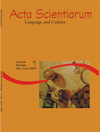<b>Power politics and the exclusion of individuals and languages in Brazilian society</b> - DOI: 10.4025/actascilangcult.v30i2.477
Abstract
Current essay analyzes the introduction of bilingualism in the mid-1970s as a strategy of power politics to domesticate linguistic differences among the indigenous peoples of Brazil. Discourse Analysis’s theoretical presuppositions verify the production conditions and the social and historical context in which bilingual learning was introduced and established. Coupled to the above, Foucault’s studies problematize the manner power spreads throughout society with the exclusion of certain groups and cultural aspects linked to them. Further, Honório (2006) investigates the introduction of bilingualism in Brazil. Issues on the problem of the introduction of bilingualism have been produced through the intercrossing of the above-mentioned theories with special reference to the linguistic situation of a Kaingang indigenous communityDownloads
DECLARATION OF ORIGINALITY AND COPYRIGHTS
I Declare that current article is original and has not been submitted for publication, in part or in whole, to any other national or international journal.
The copyrights belong exclusively to the authors. Published content is licensed under Creative Commons Attribution 4.0 (CC BY 4.0) guidelines, which allows sharing (copy and distribution of the material in any medium or format) and adaptation (remix, transform, and build upon the material) for any purpose, even commercially, under the terms of attribution.
Read this link for further information on how to use CC BY 4.0 properly.




















6.png)









